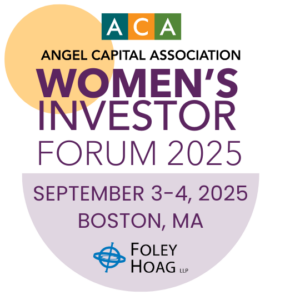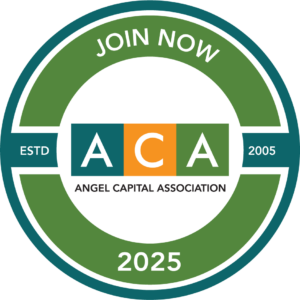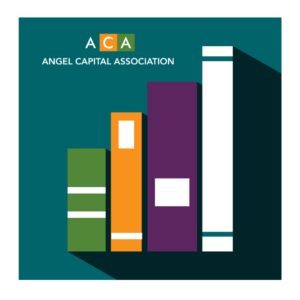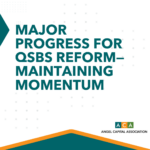 Author: John Harbison, Chairman Emeritus of Tech Coast Angels and ACA Board Member.
Author: John Harbison, Chairman Emeritus of Tech Coast Angels and ACA Board Member.
The SEC’s Accredited Investor Definition has been in place since 1982. This requirement uses two measures of wealth as surrogates for sophistication as an investor, as well as attempts to mitigate possible negative consequences of what is admittedly a risky asset class. The current SEC regulation requires investors to meet one of the following criteria:
- Net worth over $1 million, excluding primary residence (individually or with spouse or partner)
- Income over $200,000 (individually) or $300,000 (with spouse or partner) in each of the prior two years, and reasonably expects the same for the current year
The SEC is currently considering making changes in those thresholds, possibly by indexing for inflation which would mean a tripling in the amounts. This raises a serious concern about how many currently active Angel Investors would no longer qualify to make investments in early-stage companies, and what that will do to stifle innovation and slow our economy. Such a change could trigger an existential crisis for early-stage companies who would become starved for much needed capital, since substantially more companies are funded by angel investors than by any other source.
To understand this, Tech Coast Angels recently conducted a confidential survey of our 385 members, and 107 members responded – a healthy response rate. 78% of those responding members currently qualify on both the Net Worth and Income thresholds, with 20% qualifying only on the Net Worth threshold and 2% only on the Income threshold:
FIGURE 1: TCA Member Accredited Investor Definition Qualification
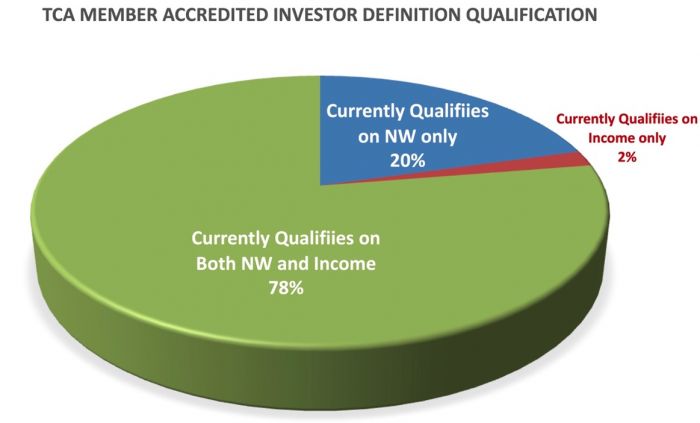
Source: June 2023 Survey of Tech Coast Angel members
In terms of changing the Income threshold, even in a very wealthy area such as parts of Los Angeles, doubling it to $400,000 would mean 51% fewer members would qualify, and tripling it (to match inflation) would mean 66% fewer members would qualify. The effects would be similarly large in other sophisticated markets and massively amplified in other regions. This would trigger a dramatic reduction of the amount of capital deployed to early-stage companies, as well as threaten the viability of many angel groups, the worker bees of capital formation:
FIGURE 2: Eligibility Reduction Based on Income
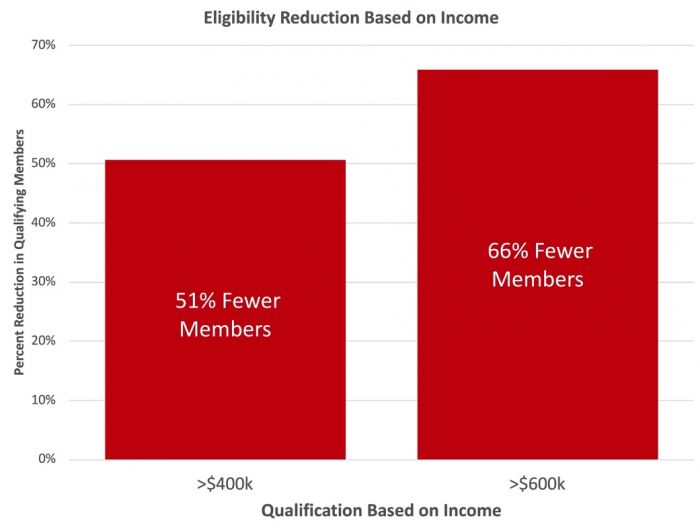
Source: June 2023 Survey of Tech Coast Angel members
In terms of changing the threshold for Net Worth qualification, a doubling or tripling of the qualifying amount would also have a severe impact:
FIGURE 3: Eligibility Reduction Based on Net Worth
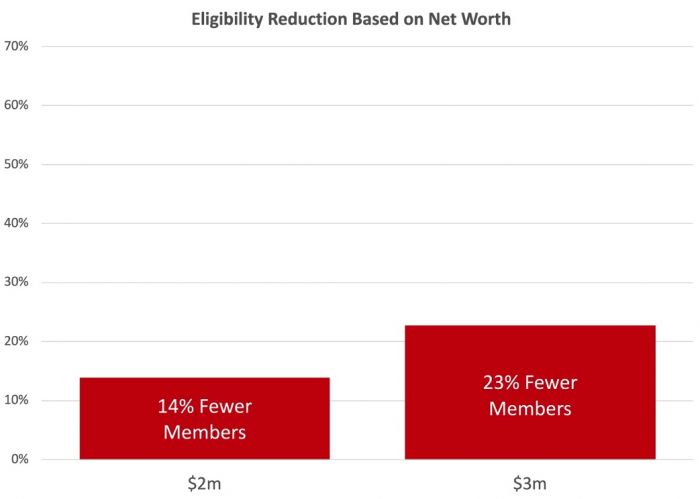
Source: June 2023 Survey of Tech Coast Angel members
Combining the criteria, the overall impact is similar to the impact of changing the net worth criteria since there is more wealth distribution above the threshold on net worth compared to income. While fewer members would qualify on income they would still qualify on net worth:
FIGURE 4: Eligibility Reduction Based on Income or Net Worth
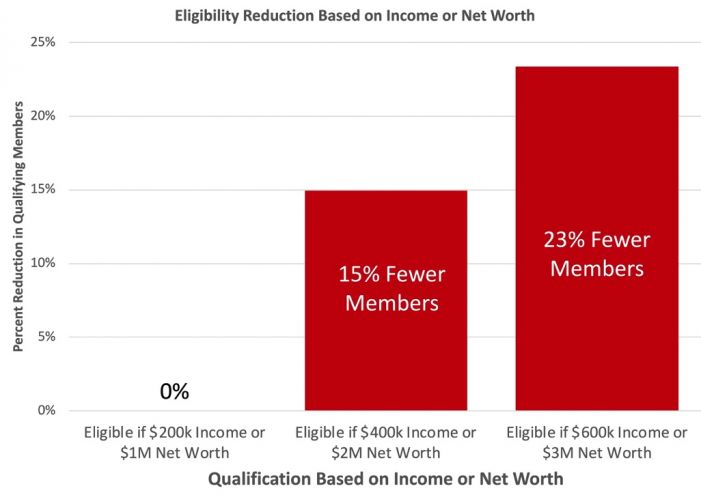
Source: June 2023 Survey of Tech Coast Angel members
In 2022, TCA provided $15.4 million in funding. If we had 23% fewer members (with the criteria fully adjusting for inflation since 1982), the funding level would have dropped $3.5 million (assuming the average investment for those that dropped was the same as for the overall average of $37,500 per member).
It is important to reiterate that the negative impact nationally would be significantly more severe since this study looked only at TCA members, the majority of whom live in Southern California where wages are significantly higher than most of the country and the net worth of angel members is likely also higher. Specifically, the negative impact would be considerably more severe in the middle of the US due to differences in income and net worth compared to the coasts — a recent national survey by ACA suggests that 53% of current investors would no longer qualify. Such a large drop in eligibility would be devastating to many angel groups particularly in America’s heartland because these groups would lose more members and some would fall well below the critical mass needed to stay viable and operating. This in turn would be devastating to capital access for companies in those parts of the country and reverse much progress that has been made in recent decades to foster innovation and early-stage companies in the underserved heartland. And in those cases where VCs follow an angel investment, any drop in the number of angel-back companies would also have an adverse effect on VC funding, even though VC funding is less reliant directly on the Accredited Investor Definition.
A more effective way to maintain and safely enhance access to capital for early-stage companies would be to provide alternative means to encourage and measure sophistication beyond simple wealth metrics. It is clear that many people with sophistication fall short of the wealth thresholds, and also no secret that many wealthy people lack sophistication as investors in this asset class. Instead, creating the option of education and sophistication tests would benefit the ecosystem by safely improving the size of the capital pool and allowing access to new investors who seek to participate in this asset class but are currently precluded due to the wealth criteria. Knowledge-based accreditation testing is a more effective solution.
Increasing the thresholds without creating an option for a sophistication test would not only hinder capital formation, but it would also halt and reverse the modest gains made in recent years getting more diversity into the investor ranks. That diversity is critical to attracting and investing in more diverse founders. Because of historical income gaps along racial lines, diverse investors have only relatively recently entered the ranks of accredited investors but if wealth criteria are raised, the more diverse investors at the bottom of the pay and wealth scale will be the first to be forced out of the investor pool. This would be an unfortunate setback in terms of access and inclusion to expand and diversify the base of investors (rather than contract it) – and spurring innovation and economic growth.
Key Takeaway
Increasing the wealth thresholds for the Accredited Investor Definition would be counterproductive and devastating to early-stage companies — causing a dramatic reduction in capital available especially beyond the higher income areas in California and the Northeast. If implemented, this would stifle innovation and slow our economy. A more thoughtful refinement would be to provide education and sophistication tests to allow more people to invest and participate.
For questions about our Data Analytics Committee or work, please reach out to us.

